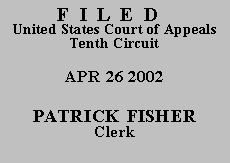

| UNITED STATES OF AMERICA, |
|
| v. | |
| TERRY WOMACK, |
Terry Womack, a federal prisoner proceeding pro se, filed a 28 U.S.C. § 2255 petition with the district court, raising four issues and requesting an evidentiary hearing. The district court denied Mr. Womack's petition on the merits and denied his request for an evidentiary hearing. When Mr. Womack indicated his intent to appeal, the district court denied him leave to proceed in forma pauperis ("IFP") and denied him a Certificate of Appealability ("COA"). Mr. Womack now requests leave to proceed IFP and requests a COA. We have jurisdiction pursuant to 28 U.S.C. § 2253, and we grant leave to proceed IFP. Nevertheless, because Mr. Womack fails to show that the district court's reasoning was incorrect or even debatable, we deny a COA and dismiss the appeal.
Following his conviction for violation of 21 U.S.C. § 846 (conspiracy to manufacture and distribute methamphetamine), Mr. Womack was sentenced in January 1999 to a term of 168 months' imprisonment. This court subsequently affirmed his conviction on direct appeal. See United States v. Womack, No. 99-6046, 2000 WL 4763 (10th Cir. Jan. 5, 2000) (unpublished disposition).
Mr. Womack requests a COA on the same four bases he argued in his § 2255 petition--namely, that the indictment on which his conviction was based is constitutionally flawed, that he received ineffective assistance of trial counsel because of trial counsel's failure to secure the presence of an exculpatory witness during trial, that he received ineffective assistance of appellate counsel because said counsel never consulted with him during the direct appeal, and that his conviction fails to comport with the requirements of Apprendi v. New Jersey, 530 U.S. 466 (2000). To be entitled to a COA, Mr. Womack must make a "substantial showing of the denial of a constitutional right." 28 U.S.C. § 2253(c)(2). Because the district court addressed his petition on the merits, Mr. Womack may make this showing by demonstrating that reasonable jurists would find the district court's assessment of the constitutional claims to have been debatable or incorrect. See Slack v. McDaniel, 529 U.S. 473, 483-84 (2000). After a thorough review of the record and the applicable case law, we conclude Mr. Womack fails to make such a showing.
With respect to the validity of the conviction based on an allegedly faulty indictment, the district court's citation of United States v. Page, 808 F.2d 723, 726-27 (10th Cir. 1987), convinces us that its ruling on this issue is neither debatable nor incorrect. In relation to Mr. Womack's claims of ineffective assistance of trial and appellate counsel, the substantial evidence against Mr. Womack presented at trial leads us to conclude that he cannot satisfy the prejudice prong of Strickland v. Washington, 466 U.S. 668, 687, 691-96 (1984), even considering the non-participation of his one exculpatory witness.(1) Therefore, we conclude jurists would not find the district court's decision to be debatable or wrong. Finally, Mr. Womack fails to articulate a valid Apprendi claim because his sentence was within the statutory maximum, as explained by the district court. Therefore, he cannot show the district court's conclusion on this matter was incorrect or debatable.
We GRANT Mr. Womack's request to proceed IFP. Based on the forgoing reasoning and for substantially the same reasons set forth in the district court's May 10, 2001 order,(2) we DENY Mr. Womack's request for a COA and DISMISS his appeal.
Entered for the Court,
Robert H. Henry
Circuit Judge
The attachment could not be reformatted.
*. This order and judgment is not binding precedent, except under the doctrines of res judicata, collateral estoppel, and law of the case. The court generally disfavors the citation of orders and judgments; nevertheless, an order and judgment may be cited under the terms and conditions of 10th Cir. R. 36.3.
1. We have not-insignificant concerns about Mr. Womack's allegation that appellate counsel failed to consult with him during the direct appeal. Assuming his allegation is correct, however, the evidence against Mr. Womack and the content of the direct appeal fail to convince this panel that a constitutional error occurred. Cf. McCrae v. Blackburn, 793 F.2d 684, 688 (5th Cir. 1986) (failure of appellate counsel to consult with petitioner prior to bringing appeal did not satisfy Strickland's prejudice requirement). Mr. Womack's main concerns were raised by appellate counsel, and he cannot show prejudice with respect to his other concerns.
2. A copy of the order is attached.